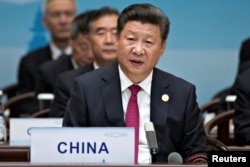After strenuous efforts during backroom negotiations running into months, China has managed to get the Group of 20 nations to pledge an end of protectionism in global trade and investments, which has been severely hurting its economy. But it will be a long time before China will reap any benefit, because the G20 gave its members until 2018 to implement the pledge.
"We extend our commitments to standstill and rollback of protectionist measures till the end of 2018, reaffirm our determination to deliver on it and support the work of the WTO (World Trade Organization), UNCTAD (United Nations Conference on Trade and Development) and OECD (Organization for Economic Cooperation and Development) in monitoring protectionism," the G20 said in a joint communique after a two-day meeting between leaders of 20 wealthier nations.
Even this success came at a price, after Chinese negotiators agreed to address complaints China encourages unfair competition by subsidizing steel production. Western countries have been complaining that subsidized steel from China was hitting the global industry and resulting in job losses. The United States responded by imposing a 500 percent duty on Chinese steel.
The G20 gave legitimacy to the complaint with the joint statement saying, "We also recognize that subsidies and other types of support from government or government-sponsored institutions can cause market distortions and contribute to global excess capacity and therefore require attention."
Property rights protection
The joint communique came at the end of a two-day meeting of heads of states from 20 wealthier countries at the Chinese lake city of Hangzhou. Those attending the meeting included U.S. President Barack Obama, Russian leader Vladimir Putin, British Prime Minister Theresa May, Indian Prime Minister Narendra Modi and South African leader Jacob Zuma.
China has also been demanding the G20 adopt a motion on innovative growth and sharing of technologies to bring about global development in an equitable manner. Once again, Beijing won superficial success because Western negotiators made sure their concern over intellectual property rights was voiced. Developed countries have been fretting about IPR theft by Chinese companies, who obtain the results of expensive research without paying for them.
The G20 agreed to take forward the agenda of innovative growth while saying, "In furtherance of the above, we emphasize the importance of open trade and investment regimes to facilitate innovation through Intellectual Property Right protection, and improving public communication in science and technology."
Policy reform
G20 members, who constitute the world's 20 wealthier nations, agreed to seek long term policy solutions for global economic weaknesses instead of relying on short term measures like fiscal spending and monetary easing.
"We are confident that, through joint efforts, we are able to steer the world economy back to a robust, sustainable, balanced and inclusive growth track," Chinese President Xi Jinping said at a news conference at the end of the deliberations. "Facts have told us that the old road of simply relying on fiscal and monetary policies is a dead end," he said.
The Chinese leader said the G20 agreed to continue reform of the International Monetary Fund and the World Bank to give more voice to developing countries and emerging markets. Reforming these institutions, which are perceived to be dominated by Western countries, has been a major demand from Beijing.
The G20 members agreed to promote trade multilateralism and work against protectionism, and developed a guideline for global investment, the first framework rule for cross-border investment.
"We will work harder to build an open world economy, reject protectionism, promote global trade and investment, including through further strengthening the multilateral trading system and ensure broad-based opportunities through and public support for expanded growth in a globalized economy," the G20 governments said.
The world leaders also agreed to bring more transparency in energy markets "to better reflect the changing realities of the world's energy landscape, and shaping an affordable, reliable, sustainable and low greenhouse gas (GHG) emissions energy future while utilizing energy sources and technologies."





